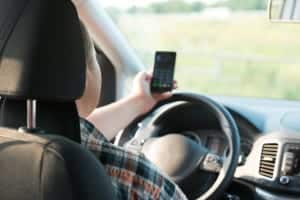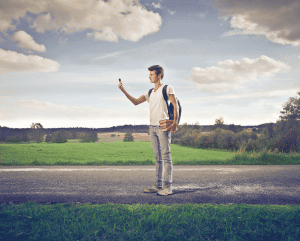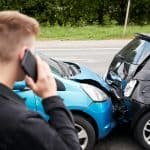
According to a survey conducted by the IAM (Institute of Advanced Motorists) in March 2012, using a Smart-Phone whilst driving caused 1,690 accidents between 2006-2010. Of this number 110 were fatal, although police believe these figures are actually higher, as there is often no way to check if a driver was using their phone at the time of an accident. With more and more of the UK population owning one of these high-power pocket computers, surely this number is sadly only set to rise. The same report estimates that drivers who use phones
spend around half their time behind the wheel looking away from the road, as compared to normal drivers who only take their eyes off the road around 10% of the time.
Behind The Wheel
People often see many driving laws, such as the speed limit or proper signalling, as guidelines rather than rules that have been instigated to save people’s lives and make roads safer. The previously mentioned IAM survey reports that over 53% of 17-24 year olds, an already high risk group, admit to using their mobile phones whilst behind the wheel. The TRL (Transport Research Laboratory) has also found that on average reaction times are 37.4% slower whilst texting or using the internet on a Smart-Phone, whilst driving under the influence of marijuana or alcohol is relatively safer, only impeding reaction times by 21% and 12.5% respectively. This means that using a Smart-Phone whilst driving is one of the most dangerous things a driver can do.
Pedestrian Problems

It’s not just Smart-Phone use by drivers that’s leading to an increase in accidents. Apparently using a Smart-Phone for any kind of activity whilst walking can create a kind of inattention blindness, where people’s focus on their phone can shut-down their other senses. We’ve all been in a situation where someone has practically bumped into us on a pathway, when they’ve been so engrossed in their phone that they weren’t looking where they were going. Imagine the problems this could cause if the same person were to walk out into a road without realising. Scientific studies also show that we’re better at noticing people when we make strong eye contact. This means that most drivers will slow down if you stare directly at them whilst crossing roads. If someone’s on their phone and fails to notice a car coming towards them, this also therefore increases their chances of not being noticed by the driver until it’s too late.
Tougher Punishments

In May 2013, UK Minister for Transport Patrick McLoughlin indicated that a number of fines would rise for certain infractions whilst driving. Amongst these was a ruling that the fixed penalty fine for texting or Smart-Phone usage whilst in control of a car will rise to £90. The ministry are also increasing fines for lighting a cigarette or eating whilst driving, as these are said to distract drivers in the same manner as phones. However, with many people viewing these punishments in the same light as going 35 mph in a 30 zone, do they go far enough to really impress the dangers of distractions on motorists?
Social Media
In the 1980s the media managed to create a change culture that woke up the UK’s population to the dangers of travelling without using seat-belts in the front of their car. Successive campaigns managed to also get people using the belts in the back of their car, so could such a scheme help make bad Smart-Phone practices a thing of the past too? We certainly believe that a government-backed advertising program that involves the type of social media sites that Smart-Phone users are often browsing whilst walking or in vehicles could have a massive impact. Facebook and similar sites could flash up sudden adverts that simulate the panic created by a sudden accident to shock people into a realisation of the danger that they are causing to themselves and other road users.
The Solution
One thing is definitely clear, as a society we need to have a rethink about our behaviour regarding Smart-Phone usage. This new technology has crept up on the UK population so rapidly it seems like we have not had time to really understand the danger it poses to our lives through distraction. However, over the last decade, we’ve managed to cope with a number of cultural changes, including the smoking ban, where it now seems incredibly alien to even consider that someone might light up a cigarette in a restaurant or pub. Hopefully we can somehow manage to arrive at a place where using a phone whilst walking on a pathway or behind the wheel seems equally abhorrent.












